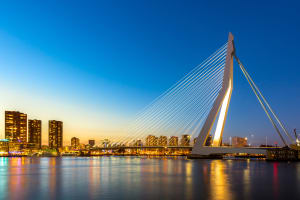
Stadion Feijenoord, commonly known as De Kuip, is a famous football stadium located in the southern part of Rotterdam, Netherlands. It is the home ground of Feyenoord Rotterdam, one of the most successful and popular football clubs in the Netherlands. De Kuip is renowned for its rich history, passionate fan base, and impressive atmosphere during matches.
Key facts about Stadium Feijenoord (De Kuip):
History: De Kuip was officially opened on March 27, 1937, and has been the home of Feyenoord Rotterdam ever since. The stadium was built to replace the club's previous ground, Kromme Zandweg, which had become too small to accommodate the growing number of supporters.
Architecture: De Kuip's architecture is characterized by its iconic bowl-shaped design, with steep stands surrounding the pitch. The stadium has a classic and distinctive appearance that has remained relatively unchanged over the years.
Capacity: As of my last update in September 2021, De Kuip has a seating capacity of approximately 51,117 spectators for football matches. However, it can accommodate more spectators for concerts and other events.
Hosted Events: Over the years, De Kuip has hosted numerous important football matches, including domestic league fixtures, cup finals, and international matches. It has also been the venue for various UEFA Champions League and UEFA Europa League matches.
Feyenoord Matches: De Kuip is the spiritual home of Feyenoord Rotterdam and holds a special place in the hearts of the club's passionate supporters. The stadium has been the backdrop for many memorable moments in Feyenoord's history, including their Eredivisie and KNVB Cup triumphs.
Concerts and Events: In addition to football matches, De Kuip is utilized for various other events, such as concerts, music festivals, and cultural shows. Its large capacity and adaptable facilities make it an ideal venue for entertainment events.
Accessibility: The stadium's location in Rotterdam makes it easily accessible by public transport and car.
De Kuip is not just a football stadium; it is a symbol of Feyenoord's identity and a cultural landmark in Dutch football. Its rich history, classic design, and passionate atmosphere make it a cherished venue for football enthusiasts and a sought-after location for various events in the Netherlands.
Explore Near Stadium Feijenoord
Discover 5 attractions, 5 cities, and 2 airports within 75km. Perfect for planning day trips, finding connecting flights, or discovering new destinations to explore during your visit.
Nearby Attractions & Places to Visit
5 destinations within 2.9km - 3.9km from your location





Nearby Cities Worth Exploring
5 destinations within 4.4km - 13.9km from your location
Airports Near Stadium Feijenoord
2 destinations within 9.2km - 49.0km from your location
Cross-Border Adventures Near Stadium Feijenoord
Discover cross-border adventures near Stadium Feijenoord. Explore neighboring countries with similar attractions and extend your travel experience across borders.

